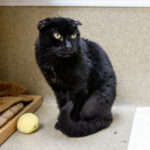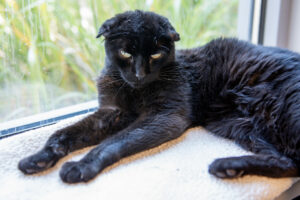 Tabby’s Place never writes off a cat.
Tabby’s Place never writes off a cat.
Their needs may be daunting. Their fears may be ferocious. Their opinions of us may be … unprintable.
No matter. We will not dismiss them. We will not give up on them. We will love them as they are.
We do not write cats off.
Even more astounding, they do not write us off.
Apricot has been taking notes since the day she came to Tabby’s Place. If she wrote the way that we do, her handwriting would be small and precise, observations recorded in pink gel pen.
But Apricot’s journal exists between her little origami ears. She does not leave out any detail. She does not find lunch any less interesting for recurring daily. She does not believe in throwaway moments or small talk.
Everything is big. Everything is worth writing down. Nobody is unworthy of writing in.
Nobody deserves to be written off.
Nobody can find the missing pages in Apricot’s history, and she is not inclined to divulge the details. All we know is that she was once someone’s prized peach, safe in the storybook of a home.
That’s where the ink gets smeary. Apricot landed outside. The only hug she knew was her own little ears, folded inward as though to pet and comfort her. We will never know the full story, only that love lost the plot.
 We know what we would have done, if we were the ones between those crumpled ears.
We know what we would have done, if we were the ones between those crumpled ears.
We would have taken our hope for human beings and wadded it up like wastepaper. We would have pawned our trust for the cold comfort of self-protection.
We would have written people off.
But every time you write someone off, you sign a contract with cynicism. Your ink dries up, and so does your heart. You write yourself out of the dangerous, wonderful story where people can still surprise you.
Being mere humans, we write people off for a single surly Facebook post, or taking the last mozzarella stick.
But this is not the way of cats. Apricot turned the page.
Sometimes, it took her full weight to hold the book open. There is a difference between “trusting people” and “trusting that it is possible to trust people.” For many months, Apricot lived between these chapters.
She stayed as small as a nectarine. She watched people unfurl blankets, fresh from the dryer. She listened to Ginny‘s smiling voice (we have all known the power of an audible smile, and it has saved our lives).
She took notes on other cats, older cats, odder cats. All around Apricot, cats became containers for sun in the window seat, or containers for love in laps.
Rambunctious Rori was congratulated for being a rascal. Spindly Smokey was cradled like an elderly newborn. Tux, age twenty-two, inspired veneration. Cats were adopted, cats were accepted, and cats were awarded paper French fry dishes full of meat product, which is proof of a kindly universe.
 At last, she turned the page again.
At last, she turned the page again.
When you are open to the possibility, or at least the possibility of the possibility, that people can be tender and good, you remain young all the days of your life.
When you refuse to write anyone off, you do not walk around with love’s obituary in your pocket.
When you are as brave as Apricot, you get cast as the protagonist in the greatest novel of all time.
Apricot gave us a second chance, and Apricot received her own rebirth. At age twelve, she is precious again. Kisses are sweeter than pie. This time, there will be no plot twist.
Apricot never wrote people off, and now she tastes the fruits of trust.
Perhaps we should be writing this down.
And if you would like to write a love letter of your own to elderly cats like Apricot, you can donate to our Remember the Seniors Fund Drive. Today is the last day!
